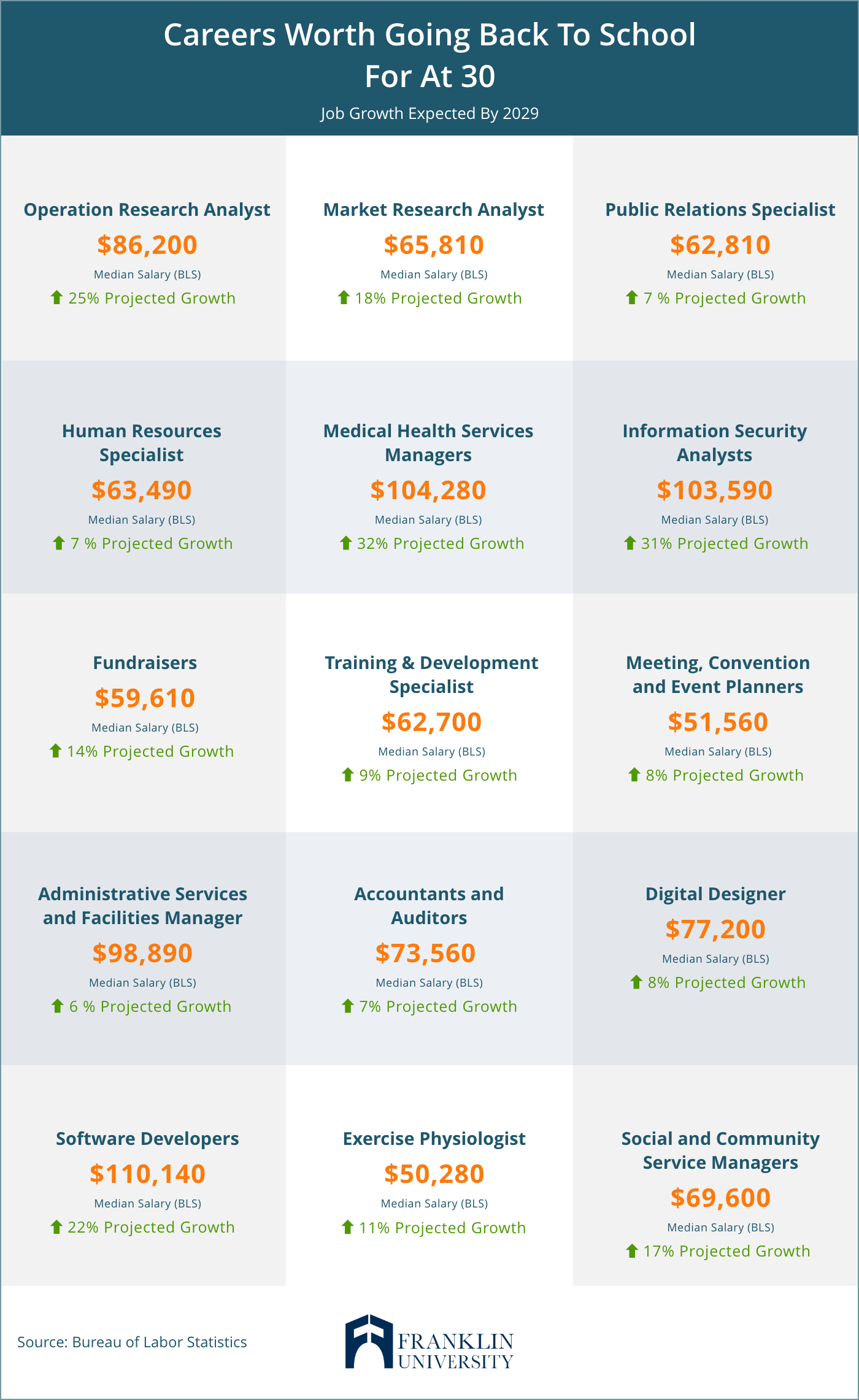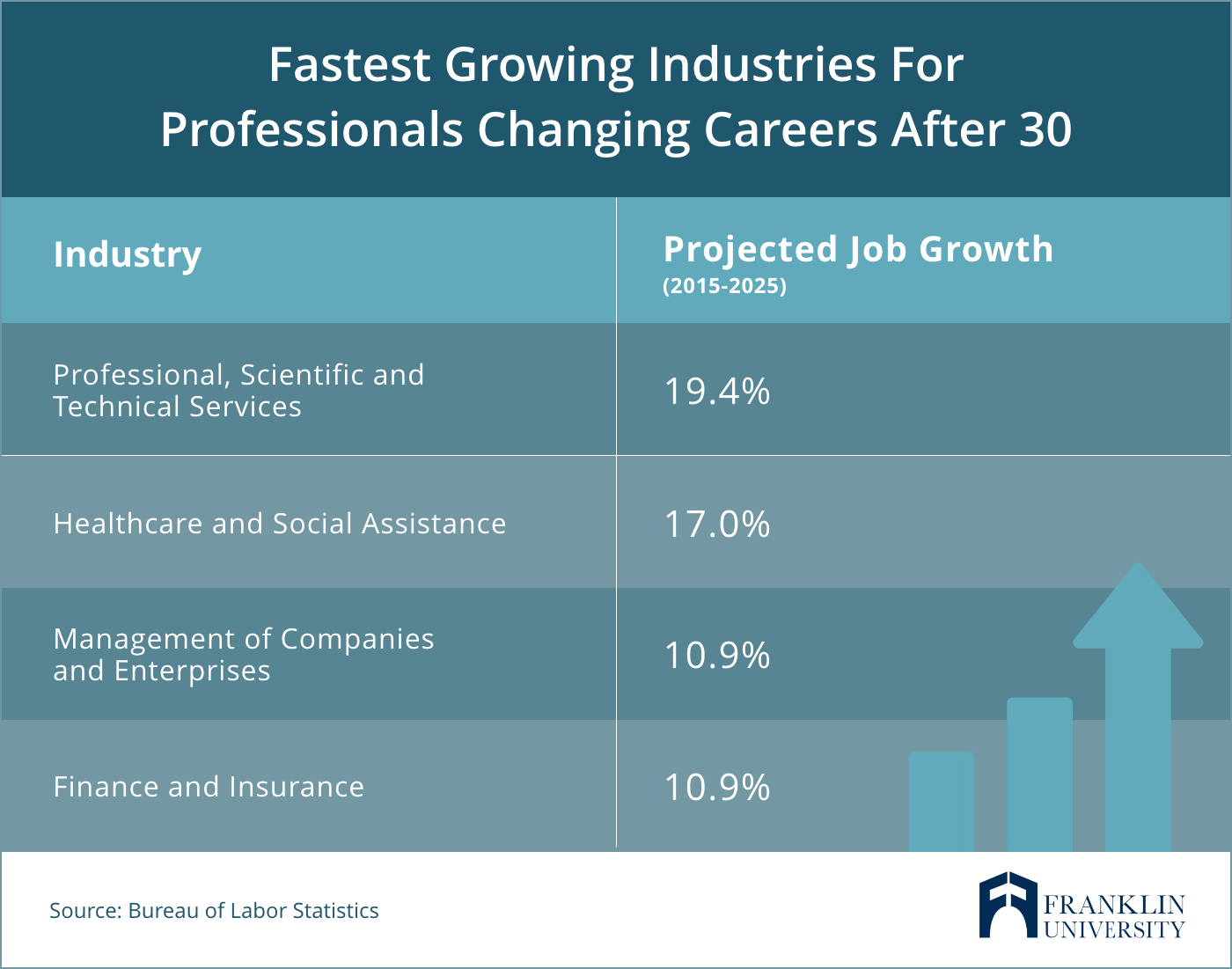Request Information
We're Sorry
There was an unexpected error with the form (your web browser was unable to retrieve some required data from our servers). This kind of error may occur if you have temporarily lost your internet connection. If you're able to verify that your internet connection is stable and the error persists, the Franklin University Help Desk is available to assist you at helpdesk@franklin.edu, 614.947.6682 (local), or 1.866.435.7006 (toll free).
Just a moment while we process your submission.

Best Careers For Going Back To School At 30
The job market today looks significantly different than it did 10+ years ago. If you haven’t completed your college degree, the evolving job market provides an opportunity to go back to school and gain skills that will prepare you for the next stage of your career.
However, some 30 year olds find the thought of returning to college intimidating. Don’t worry; it’s increasingly common for individuals in their 30s to go back to school. According to the Chronicle of Higher Education, as of Fall 2019, over 2.3 million college students were 30-39 years old, which accounts for 11.8% of total college enrollment.
It can actually be beneficial to get your degree in your 30s after gaining professional experience. Your work experience can help you identify what you enjoy, what you don’t, and skills gaps that a college education can help you address.
If you’re in your 30s looking to upskill or change careers, we’re here to help you find promising careers that will inspire you to take the plunge and go back to school.
Top Careers For People Going Back To School At 30
Going back to school in your 30s can be a gamechanger for your long-term career success. Most of today’s fastest-growing careers require a bachelor’s degree.

When it comes to paying for school, grants are among your best options. But do you know how to find them? Remove the guesswork by downloading this free guide
We’ve compiled a list of 15 of the top careers for 30 year olds going back to school. These positions were selected for their growth potential, job stability and career longevity, which suggest they would be an ideal fit for this age group. Each job includes figures for median salary and projected job growth, as well as suggested education and degree difficulty. High difficulty indicates that a degree requires highly specialized and technical skills—such as advanced mathematics or computer coding. Low difficulty indicates that transferable skills—such as communication and critical thinking—play a large role in the degree coursework.
1. Operations Research Analysts
Operations research analysts use advanced mathematical and analytical methods to help organizations solve challenges and make more informed decisions. These professionals help allocate resources, develop production schedules, manage the supply chain and set prices.
- Median Salary (BLS): $86,200
- Projected Growth (2029): 25%
- Suggested Education: Bachelor’s Degree in Operations and Supply Chain Management
- Difficulty of Education: High
2. Market Research Analysts
Market research analysts study industry and competitive conditions to examine potential sales of a product or service. They help organizations determine what products people want, who will buy them and at what price.
- Median Salary (BLS): $65,810
- Projected Growth (2029): 18%
- Suggested Education: Bachelor’s Degree in Marketing
- Difficulty of Education: Medium
3. Public Relations Specialists
Public relations specialists create and sustain a favorable public image for the organization they represent. They develop media releases and social media programs to help shape public perception and increase awareness of the organization’s work and goals.
- Median Salary (BLS): $62,810
- Projected Growth (2029): 7%
- Suggested Education: Bachelor’s Degree in Public Relations
- Difficulty of Education: Low
4. Human Resources Specialists
Human resources specialists have a broad base of responsibilities. They recruit, screen, interview and hire employees. They also handle employee relations as well as compensation, benefits and training.
- Median Salary (BLS): $63,490
- Projected Growth (2029): 7%
- Suggested Education: Bachelor’s Degree in Human Resources Management
- Difficulty of Education: Low
5. Medical and Health Services Managers
Medical and health services managers plan, direct and coordinate the business activities of healthcare providers. They may manage an entire facility, a specific clinical area or department or physicians’ medical practices.
- Median Salary (BLS): $104,280
- Projected Growth (2029): 32%
- Suggested Education: Bachelor’s Degree in Healthcare Management
- Difficulty of Education: Medium
6. Information Security Analysts
Information security analysts plan and carry out security measures to protect an organization’s computer networks, systems and data. As the number of cyberattacks increases, their responsibilities, as well as job opportunities, are continually expanding.
- Median Salary (BLS): $103,590
- Projected Growth (2029): 31%
- Suggested Education:Bachelor’s Degree in Cybersecurity
- Difficulty of Education: High
7. Fundraisers
Fundraisers organize events and campaigns to raise money and gather other donations for an organization. They also design promotional materials to increase awareness of an organization’s work, goals and financial needs.
- Median Salary (BLS): $59,610
- Projected Growth (2029): 14%
- Suggested Education: Bachelor’s Degree in Communications
- Difficulty of Education: Medium
8. Training and Development Specialists
Training and development specialists help plan, conduct, and administer programs that train employees to improve their skills and knowledge. In today’s technologically advanced workplace, they often design online learning modules and course materials.
- Median Salary (BLS): $62,700
- Projected Growth (2029): 9%
- Suggested Education: Bachelor’s Degree in Human Resources Management
- Difficulty of Education: Low
9. Meeting, Convention and Event Planners
Meeting, convention and event planners arrange all aspects of events and professional gatherings. They meet with clients to determine the purpose of the event, negotiate contracts with suppliers or talent, and handle day-of logistics.
- Median Salary (BLS): $51,560
- Projected Growth (2029): 8%
- Suggested Education: Bachelor’s Degree in Communications
- Difficulty of Education: Low
10. Administrative Services and Facilities Managers
Administrative services and facilities managers plan, direct, and coordinate activities that help an organization run efficiently. Typically, these professionals maintain facilities and supervise activities that include recordkeeping, mail distribution and office upkeep.
- Median Salary (BLS): $98,890
- Projected Growth (2029): 6%
- Suggested Education:Bachelor’s Degree in Applied Management
- Difficulty of Education: Low
11. Accountants and Auditors
Accountants and auditors prepare and examine financial records for businesses and individuals, as well as identify potential areas of financial opportunity and risk. They ensure that all records are accurate, data risks are evaluated, and taxes are paid properly.
- Median Salary (BLS): $73,560
- Projected Growth (2029): 7%
- Suggested Education:Bachelor’s Degree in Accounting
- Difficulty of Education: High
12. Digital Designer
Digital designers are responsible for the look and user experience of a website or application. They develop, create and test website or interface layout, functions and navigation for usability.
- Median Salary (BLS): $77,200
- Projected Growth (2029): 8%
- Suggested Education: Bachelor’s Degree in Interactive Media Design
- Difficulty of Education: High
13. Software Developers
Software developers design computer applications or programs. They are responsible for identifying the core functionality a user needs and system requirements, as well as writing code to meet these requirements.
- Median Salary (BLS): $110,140
- Projected Growth (2029): 22%
- Suggested Education: Bachelor’s Degree in Computer Science
- Difficulty of Education: High
14. Exercise Physiologists
Exercise physiologists develop fitness and exercise programs that help injured or sick patients recover. These programs are typically for patients with chronic diseases that need to improve fitness in areas such as cardiovascular function, body composition and flexibility.
- Median Salary (BLS): $50,280
- Projected Growth (2029): 11%
- Suggested Education:Bachelor’s Degree in Exercise Science
- Difficulty of Education: Low
15. Social and Community Service Managers
Social and community service managers coordinate and supervise programs and organizations that support public well-being. Oftentimes, these professionals work for organizations that focus on working with a particular demographic, such as veterans, or specific challenges, such as substance abuse.
- Median Salary (BLS): $69,600
- Projected Growth (2029): 17%
- Minimum Required Education: Bachelor’s Degree in Public Administration or Bachelor’s Degree in Health Education & Promotion
- Difficulty of Education: Medium
Of The Top Growing Industries For Career Changers Over 30
As technology continues to advance at an exponential rate, you need to position yourself for the future. Going back to school in your 30s gives you the opportunity to gain new skills that will future-proof your career and help you join a thriving industry.

Let’s look at 4 of the fastest growing industries that offer outsized opportunities for professionals in their 30s.
- Professional, Scientific and Technical Services: Organizations in this industry provide highly technical or specialized services to clients. These organizations offer a wide variety of services—including consulting, research, design and technology—making this a diverse industry full of career potential.
- Healthcare and Social Assistance: This industry includes organizations that provide medical and/or social services—including hospitals, extended care facilities, nonprofits and government agencies. An aging population, diverse healthcare needs and more accessible health insurance continue to spur growth in this industry.
- Management of Companies and Enterprises: Establishments in this industry perform strategic or organizational planning and decision making roles. Growth in this industry will require more professionals with strong business administration and management skills.
- Finance and Insurance: Companies in this industry primarily engage in raising funds by taking deposits and/or issuing securities, pooling risk by underwriting insurance and providing specialized financial services to clients. As this sector grows, finance and business analysis occupations will continue to trend higher.
With the right education and skills, opportunities in these sectors will continue to grow. As someone 30 or over returning to school, this growth provides higher earnings potential, advancement opportunities and job stability far into the future.
Why Going Back to School In Your 30s Is Worth It
Thirty is not too old to get your bachelor’s degree or change your career. However, finding the right college for your unique needs is key to being successful as a 30-year-old college student.
Franklin University has been serving the needs of working adults for over 115 years. The average student age at Franklin is 34, which means you’ll be surrounded by like-minded peers dedicated to advancing their education. Franklin provides flexible, online degree programs that can be completed on your schedule because your success depends on balancing your education with work, family and other priorities.
See all of the reasons Franklin University is built for working adults and how Franklin’s wide variety of online bachelor’s degree programs can set you up for a growing career in a thriving industry.





